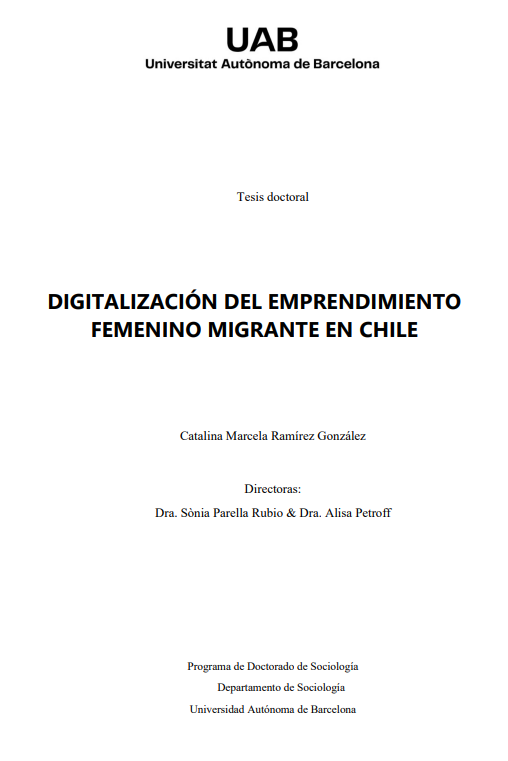Doctoral thesis defense of Catalina Marcela Ramírez
Digitalización del emprendimiento femenino migrante en Chile

This research analyzes digitalization in migrant women's entrepreneurship through the program "Digital Transformation of Businesses," led by Migrant Woman Entrepreneur: Collaborative Growth Community in Chile. The focus on migrant women entrepreneurs is justified as they are one of the groups most affected by the SARS-CoV-2 pandemic (CEPAL, 2021). The specificity of the study in Chile is due to its significant and growing migrant population and its dynamism in adopting digital technologies since the onset of the pandemic.
The research lies at the intersection of three key fields: female migration, women’s entrepreneurship as a strategy for economic integration in the host country, and platform economies. For migrant women, entrepreneurship represents a high-risk decision during a critical moment of uncertainty, such as migration. The success of migrant women entrepreneurs is not solely based on individual resources, such as human and social capital, but also on their ability to navigate and negotiate within institutional systems and markets often biased by ethnicity and gender (Kloosterman and Rath, 2001; Ogbor, 2000).
This thesis mainly focuses on businesses that incorporate digital platforms. This approach highlights the relevance of digitalization, an emerging phenomenon accelerated by the pandemic, facilitating the transversal integration of digital platforms into the labour market and entrepreneurship (Jawad et al., 2020; Surie, 2020). It questions the “agency” and “role” of technology, considering how social practices can generate both continuities and discontinuities compared to their analogue versions (Cruz, 2017).
The multidimensionality of the Life Course perspective is adopted as a theoretical framework, recognizing the interaction between micro, meso, and macrostructural levels. The research employs a third-order analysis linking time, level, and domain. The proposed model identifies inflexion points that connect structural changes with personal and professional development. In this environment, women act as both sellers and customers, as the data generated through sales processes is used to profile and enrich platform databases.
The main objective of this research was to analyze how the women entrepreneurs in the MWE program manage and digitalize their businesses within the platform economy, exploring the tensions and strategies that arise from the relationship between their migratory, labour, educational, family, and technological trajectories with their business practices.
To achieve this objective, the methodology was a mixed-methods design. The research began with a quantitative phase through an online survey to characterize the participating entrepreneurs. Subsequently, a qualitative phase was developed, including 50 semi-structured interviews, observation of digital profiles, and a structured interview conducted twelve months after the program's completion. This thorough approach provided a comprehensive understanding of these women’s experiences in their digitalization process, highlighting both the barriers faced and the strategies developed to overcome these challenges.
The study highlights that the pandemic acted as a macrostructural turning point, creating new business opportunities for some entrepreneurs, while others with more consolidated trajectories used digitalization to strengthen their projects. This underscores the potential of technology to create new opportunities, even in challenging times. However, significant barriers were also identified, such as the need to balance work and family domains. In this context, the entrepreneurs’ previous educational and labour trajectories played a crucial role in their success in adapting to the digital environment.
Date: 29/11/2024
Hour: 16h
Place: Sala de Graus (Fac. Ciències Polítiques i Sociologia)